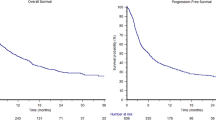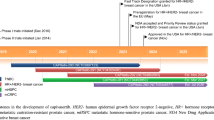Abstract
Background
Regorafenib is an oral multi-kinase inhibitor that has been established as third-line treatment for patients after the failure of imatinib and sunitinib. However, since clinical data of regorafenib in the Japanese population are still lacking, the management of regorafenib is mainly based on the clinical experience of each oncologist. The aim of this study was to evaluate the efficacy and safety of regorafenib in a Japanese population.
Methods
Thirty-three patients treated with regorafenib for metastatic and recurrent gastrointestinal stromal tumors were retrospectively enrolled. This study investigated the anti-tumor effect, including overall survival, progression-free survival, and safety, which was evaluated based on the incidence of adverse events.
Results
The median overall survival of patients treated with regorafenib was 23.8 months and the 1-year overall survival rate was 80.0%, the median progression-free survival was 7.1 months and the 1-year progression-free survival rate was 40.2%. The responses to regorafenib were partial response in 3 cases (9.1%), stable disease in 17 (51.5%), progressive disease in 10 (30.3%), and non-evaluable in 3 (9.1%). The disease control rate was 54.0%. Treatment-related adverse events were reported in all patients, with the most common being hand-foot syndrome (72.7%), followed by liver damage (36.4%) and diarrhea (27.3%), and six patients (20.0%) were discontinued due to adverse events.
Conclusion
This is the first report of Japanese patients with gastrointestinal stromal tumors treated with regorafenib. Regorafenib showed efficacy and a manageable safety profile in Japanese patients with advanced gastrointestinal stromal tumors, which was comparable with previous studies.




Similar content being viewed by others
Data availability
The data that support the findings of this study are available on request from the corresponding author, Tsuyoshi Takahashi. The data are not publicly available because they contain information that can compromise the privacy of research participants.
References
DeMatteo RP, Lewis JJ, Leung D et al (2000) Two hundred gastrointestinal stromal tumors: recurrence patterns and prognostic factors for survival. Ann Surg 231:51–58
Steigen SE, Eide TJ (2006) Trends in incidence and survival of mesenchymal neoplasm of the digestive tract within a defined population of northern Norway. APMIS: Acta Pathologica, Microbiologica, et Immunologica Scandinavica 114:192–200
Miettinen M, Lasota J (2006) Gastrointestinal stromal tumors: pathology and prognosis at different sites. Semin Diagn Pathol 23:70–83
Joensuu H (2008) Risk stratification of patients diagnosed with gastrointestinal stromal tumor. Hum Pathol 39:1411–1419
Hirota S, Isozaki K, Moriyama Y et al (1998) Gain-of-function mutations of c-kit in human gastrointestinal stromal tumors. Science (New York, NY) 279:577–580
Heinrich MC, Corless CL, Duensing A et al (2003) PDGFRA activating mutations in gastrointestinal stromal tumors. Science (New York, NY) 299:708–710
Heinrich MC, Corless CL, Demetri GD et al (2003) Kinase mutations and imatinib response in patients with metastatic gastrointestinal stromal tumor. J Clin Oncol 21:4342–4349
Demetri GD, von Mehren M, Blanke CD et al (2002) Efficacy and safety of imatinib mesylate in advanced gastrointestinal stromal tumors. N Engl J Med 347:472–480
Verweij J, Casali PG, Zalcberg J et al (2004) Progression-free survival in gastrointestinal stromal tumours with high-dose imatinib: randomised trial. Lancet 364:1127–1134
Demetri GD, von Mehren M, Antonescu CR et al (2010) NCCN Task Force report: update on the management of patients with gastrointestinal stromal tumors. J Natl Compr Cancer Netw JNCCN 8(Suppl 2):S1-41
Corless CL, Fletcher JA, Heinrich MC (2004) Biology of gastrointestinal stromal tumors. J Clin Oncol 22:3813–3825
Gramza AW, Corless CL, Heinrich MC (2009) Resistance to tyrosine kinase inhibitors in gastrointestinal stromal tumors. Clin Cancer Res 15(24):7510–7518
Demetri GD, van Oosterom AT, Garrett CR et al (2006) Efficacy and safety of sunitinib in patients with advanced gastrointestinal stromal tumour after failure of imatinib: a randomised controlled trial. Lancet 368:1329–1338
Heinrich MC, Maki RG, Corless CL et al (2008) Primary and secondary kinase genotypes correlate with the biological and clinical activity of sunitinib in imatinib-resistant gastrointestinal stromal tumor. J Clin Oncol 26:5352–5359
Wilhelm SM, Dumas J, Adnane L et al (2011) Regorafenib (BAY 73–4506): a new oral multikinase inhibitor of angiogenic, stromal and oncogenic receptor tyrosine kinases with potent preclinical antitumor activity. Int J Cancer 129:245–255
Demetri GD, Reichardt P, Kang YK et al (2013) Efficacy and safety of regorafenib for advanced gastrointestinal stromal tumours after failure of imatinib and sunitinib (GRID): an international, multicentre, randomised, placebo-controlled, phase 3 trial. Lancet 381:295–302
Nishida T, Hirota S, Yanagisawa A et al (2008) Clinical practice guidelines for gastrointestinal stromal tumor (GIST) in Japan: English version. Int J Clin Oncol 13:416–430
Komatsu Y, Doi T, Sawaki A et al (2015) Regorafenib for advanced gastrointestinal stromal tumors following imatinib and sunitinib treatment: a subgroup analysis evaluating Japanese patients in the phase III GRID trial. Int J Clin Oncol 20:905–912
Eisenhauer EA, Therasse P, Bogaerts J et al (2009) New response evaluation criteria in solid tumours: revised RECIST guideline (version 1.1). Eur J Cancer 45:228–247
Hu CH, Yeh CN, Chen JS et al (2020) Regorafenib treatment outcome for Taiwanese patients with metastatic gastrointestinal stromal tumors after failure of imatinib and sunitinib: a prospective, non-randomized, single-center study. Oncol Lett 20:2131–2142
Kollàr A, Maruzzo M, Messiou C et al (2014) Regorafenib treatment for advanced, refractory gastrointestinal stromal tumor: a report of the UK managed access program. Clin Sarcoma Res 4:17
Chamberlain F, Farag S, Williams-Sharkey C et al (2020) Toxicity management of regorafenib in patients with gastro-intestinal stromal tumour (GIST) in a tertiary cancer centre. Clin Sarcoma Res 10:1
Schvartsman G, Wagner MJ, Amini B et al (2017) Treatment patterns, efficacy and toxicity of regorafenib in gastrointestinal stromal tumour patients. Sci Rep 7:9519
Hashiguchi Y, Muro K, Saito Y et al (2020) Japanese Society for Cancer of the Colon and Rectum (JSCCR) guidelines 2019 for the treatment of colorectal cancer. Int J Clin Oncol 25:1–42
Kudo M, Kawamura Y, Hasegawa K et al (2021) Management of hepatocellular carcinoma in Japan: JSH consensus statements and recommendations 2021 update. Liver Cancer 10:181–223
Grothey A, Van Cutsem E, Sobrero A et al (2013) Regorafenib monotherapy for previously treated metastatic colorectal cancer (CORRECT): an international, multicentre, randomised, placebo-controlled, phase 3 trial. Lancet 381:303–312
Bruix J, Qin S, Merle P et al (2017) Regorafenib for patients with hepatocellular carcinoma who progressed on sorafenib treatment (RESORCE): a randomised, double-blind, placebo-controlled, phase 3 trial. Lancet 389:56–66
Comprehensive molecular characterization of human colon and rectal cancer. Nature. 2012;487(7407):330–337
Kinzler KW (1996) Vogelstein B. Lessons from hereditary colorectal cancer. Cell 87:159–170
El-Serag HB, Rudolph KL (2007) Hepatocellular carcinoma: epidemiology and molecular carcinogenesis. Gastroenterology 132:2557–2576
Nakagawa H, Shibata T (2013) Comprehensive genome sequencing of the liver cancer genome. Cancer Lett 340:234–240
Cheng AL, Kang YK, Chen Z et al (2009) Efficacy and safety of sorafenib in patients in the Asia-Pacific region with advanced hepatocellular carcinoma: a phase III randomised, double-blind, placebo-controlled trial. Lancet Oncol 10:25–34
Ueda T, Uemura H, Tomita Y et al (2013) Efficacy and safety of axitinib versus sorafenib in metastatic renal cell carcinoma: subgroup analysis of Japanese patients from the global randomized Phase 3 AXIS trial. Jpn J Clin Oncol 43(6):616–628
Yeh CN, Chen MH, Chen YY et al (2017) A phase II trial of regorafenib in patients with metastatic and/or a unresectable gastrointestinal stromal tumor harboring secondary mutations of exon 17. Oncotarget 8:44121–44130
Son MK, Ryu MH, Park JO et al (2017) Efficacy and safety of Regorafenib in Korean patients with advanced gastrointestinal stromal tumor after failure of imatinib and sunitinib: a multicenter study based on the management access program. Cancer Res Treat 49:350–357
Uetake H, Sugihara K, Muro K et al (2018) Clinical features of regorafenib-induced liver injury in Japanese patients from postmarketing experience. Clin Colorectal Cancer 17:e49–e58
Lee JH, Chung YH, Kim JA et al (2013) Genetic predisposition of hand-foot skin reaction after sorafenib therapy in patients with hepatocellular carcinoma. Cancer 119:136–142
Yoshino T, Komatsu Y, Yamada Y et al (2015) Randomized phase III trial of regorafenib in metastatic colorectal cancer: analysis of the CORRECT Japanese and non-Japanese subpopulations. Investig New Drugs 33:740–750
Nannini M, Rizzo A, Nigro MC et al (2021) Standard versus personalized schedule of regorafenib in metastatic gastrointestinal stromal tumors: a retrospective, multicenter, real-world study. ESMO Open. 6:100222
Bekaii-Saab TS, Ou FS, Ahn DH et al (2019) Regorafenib dose-optimisation in patients with refractory metastatic colorectal cancer (ReDOS): a randomised, multicentre, open-label, phase 2 study. Lancet Oncol 20:1070–1082
Argiles GMN, Valladares-Ayerbes M, de Prado JV et al (2019) Results of REARRANGE trial: a randomized phase 2 study comparing different dosing approaches for regorafenib (REG) during the first cycle of treatment in patients (pts) with metastatic colorectal cancer (mCRC). Ann Oncol 30 (Abstract O-026)
Suzuki T, Sukawa Y, Imamura CK et al (2020) A phase II study of regorafenib with a lower starting dose in patients with metastatic colorectal cancer: exposure-toxicity analysis of unbound regorafenib and its active metabolites (RESET Trial). Clin Colorectal Cancer 19:13-21.e3
Heinrich MC, Corless CL, Blanke CD et al (2006) Molecular correlates of imatinib resistance in gastrointestinal stromal tumors. J Clin Oncol 24:4764–4774
Liegl B, Kepten I, Le C et al (2008) Heterogeneity of kinase inhibitor resistance mechanisms in GIST. J Pathol 216:64–74
George S, Wang Q, Heinrich MC et al (2012) Efficacy and safety of regorafenib in patients with metastatic and/or unresectable GI stromal tumor after failure of imatinib and sunitinib: a multicenter phase II trial. J Clin Oncol 30:2401–2407
Murtaza M, Dawson SJ, Tsui DW et al (2013) Non-invasive analysis of acquired resistance to cancer therapy by sequencing of plasma DNA. Nature 497:108–112
Maier J, Lange T, Kerle I et al (2013) Detection of mutant free circulating tumor DNA in the plasma of patients with gastrointestinal stromal tumor harboring activating mutations of CKIT or PDGFRA. Clin Cancer Res 19:4854–4867
Nishida T, Doi T, Naito Y (2014) Tyrosine kinase inhibitors in the treatment of unresectable or metastatic gastrointestinal stromal tumors. Expert Opin Pharmacother 15:1979–1989
Acknowledgements
We would like to thank Editage (www.editage.com) for English language editing.
Author information
Authors and Affiliations
Contributions
RT wrote the initial draft of the manuscript. TT contributed to the analysis and interpretation of the data and assisted in the preparation of the manuscript. All other authors contributed to data collection and interpretation, and critically reviewed the manuscript. All authors approved the final version of the manuscript and agreed to be accountable for all aspects of the work in ensuring that questions related to the accuracy or integrity of any part of the work are appropriately investigated and resolved.
Corresponding author
Ethics declarations
Conflict of interest
There are no conflicts of interest to declare.
Ethics approval and consent to participate
The Human Ethics Review Committee of Osaka University Graduate School of Medicine approved the protocol for this retrospective study, and each participant provided signed consent. All procedures were performed in accordance with the Declaration of Helsinki.
Consent for publication
Consent for publication was obtained from all individuals whose data appears in the paper.
Additional information
Publisher's Note
Springer Nature remains neutral with regard to jurisdictional claims in published maps and institutional affiliations.
Supplementary Information
Below is the link to the electronic supplementary material.
About this article
Cite this article
Teranishi, R., Takahashi, T., Nishida, T. et al. Efficacy and safety of regorafenib in Japanese patients with advanced gastrointestinal stromal tumors. Int J Clin Oncol 27, 1164–1172 (2022). https://doi.org/10.1007/s10147-022-02159-z
Received:
Accepted:
Published:
Issue Date:
DOI: https://doi.org/10.1007/s10147-022-02159-z




